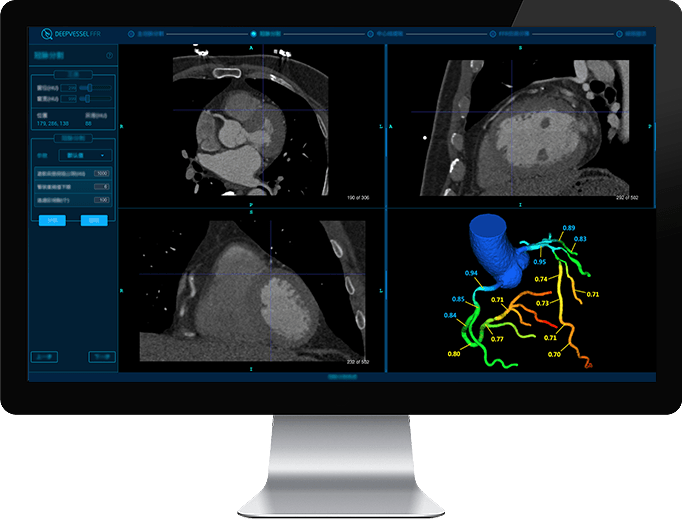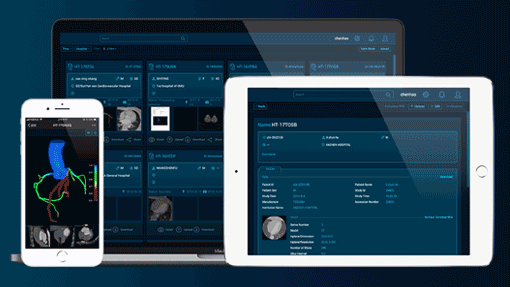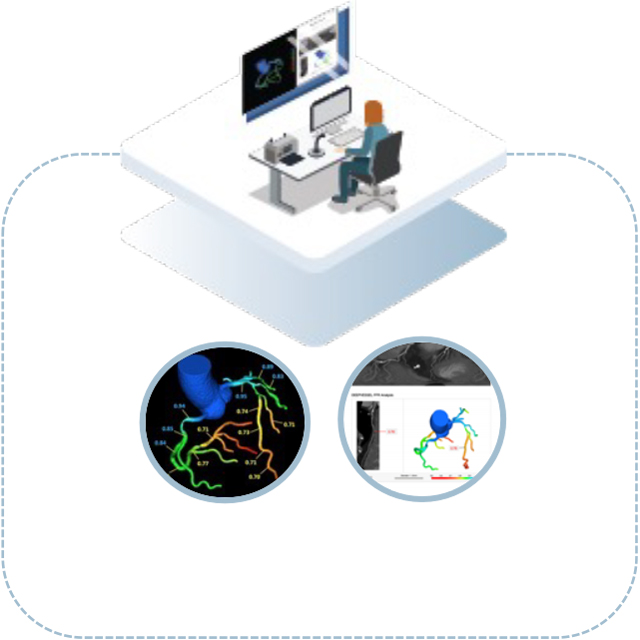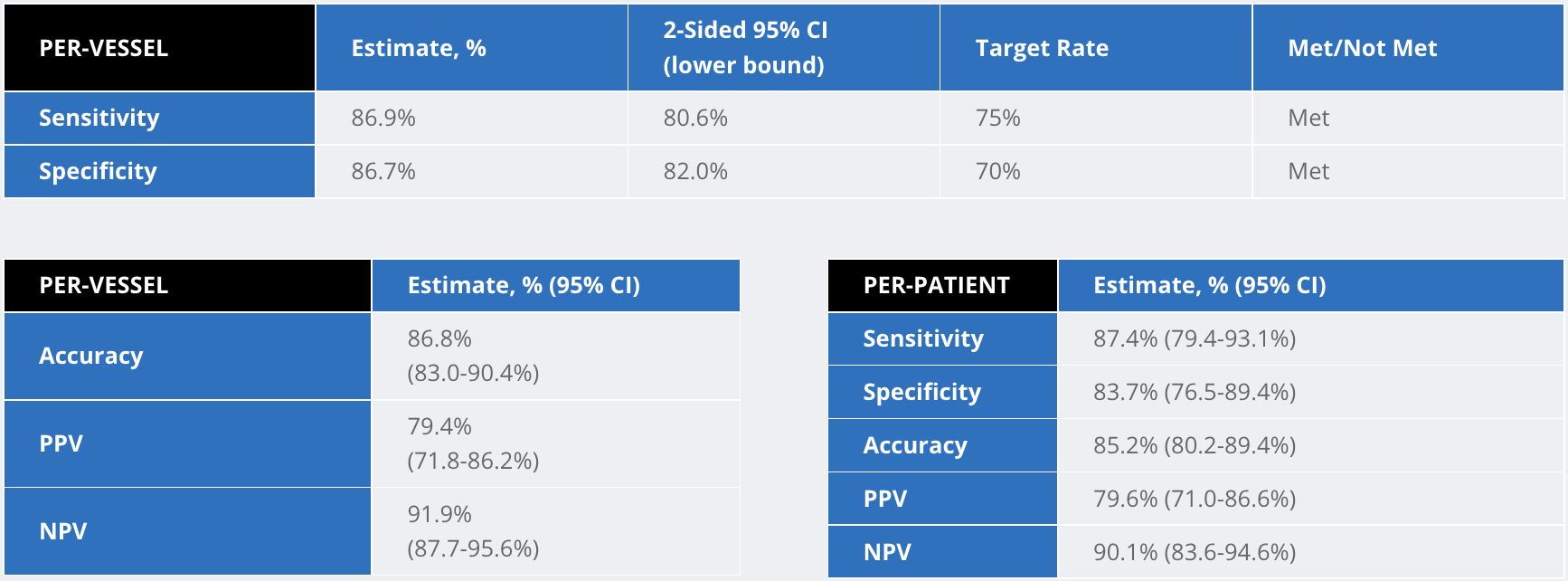DEEPVESSEL® FFR
CT FFR - Improving Diagnosis & Treatment of Patients with Coronary Artery Disease
DEEPVESSEL FFR is FDA-Cleared, CE-Marked, and NMPA-Approved.
Fast and acurate non-invasive deep learning-based CT FFR analysis
DEEPVESSEL FFR ( DVFFR) is a software medical device that uses deep learning technology to perform a non-invasive physiological functional assessment of the coronary arteries using coronary computed tomography angiography.
DEEPVESSEL FFR applies Keya Medical’s proprietary deep learning technologies built on the latest advances in computer vision and medical image analysis. This new approach gives a strong performance advantage with fast processing speed and accurate non-invasive FFR analysis.

A New Category I CPT code for non-invasive FFR
Category I CPT Code
The American College of Cardiology (ACC), American College of Radiology (ACR), and the Society of Cardiovascular Computed Tomography (SCCT) jointly proposed this change to the American Medical Association. It replaces four prior category III CPT codes.
Utilizing deep learning algorithms, CT FFR analysis with DeepVessel generates a 3D coronary artery model and simulates FFR values across the entire coronary tree.
Payment for FFR-CT services in hospital settings is now approximately 7% higher, according to the Centers for Medicare and Medicaid Services (CMS).
Code 75580 is applicable in hospital outpatient facilities, physician offices, and imaging centers. RVUs have been allocated for FFR-CT services as well.
New Path to Diagnose Coronary Artery Disease
The path of diagnosis of CAD with CT FFR starts with Coronary Computer Tomography Angiography (CCTA). CCTA is sent to Keya Medical. AI algorithms, and certified by Keya Medical analysts perform the DV FFR analysis. Interactive 3-D model of coronary arteries and PDF report with mapped FFR values are electronically delivered to clinicians. The analysis is accessible on stationary or mobile devices.


Coronary CTA
>

CT FFR Analysis
>

CT FFR Results
Ambra Health Workflow
DEEPVESSEL Analysis Steps

CCTA
+


=

Improved Patient Care and Management

FFRCT and DVFFR have transformed my practice, allowing me to provide superior patient care and achieve better outcomes. I am sincerely grateful for this invaluable resource provided by Corazon Imaging.
John A. Rumberger, PhD, MD, FACC, MSCCT
Medical Director, Corazon Imaging
Advantages
Precise
90% diagnostic accuracy using invasive FFR as the ground truth
Comprehensive
Cost Saving
Offers patient- and payer-centric pricing
Physician Autonomy
Streamlined Workflow
No certification of scanners, software maintenance, or staff training
Efficient
Product Features
Non-invasive functional assessment from CTA scan
Enables accurate and fast FFR analysis
Provides both anatomical and functional information
Novel coronary CT FFR technique driven by AI
FDA cleared
CE marked
Clinical Trials Performance Assessment
Multi-national multi-center clinical validation study ADAPT [1] 2021
- DVFFR analysis was conducted on a total of 269 patients with 358 target vessels from 10 clinical sites (5 from US and 5 from EU)
- Primary endpoint: per-vessel sensitivity and specificity of DVFFR to detect ischemic condition comparing with invasive FFR measurement
- Study demonstrated that DVFFR yielded good diagnostic performance and met pre-specified criteria for study success
| PER-VESSEL | Estimate, % | 2-Sided 95% CI (lower bound) | Target Rate | Met/Not Met |
| Sensitivity | 86.9% | 80.6% | 75% | Met |
| Specificity | 86.7% | 82.0% | 70% | Met |
| PER-VESSEL | Estimate, % (95% CI) |
| Accuracy | 86.8% (83.0-90.4%) |
| PPV | 79.4% (71.8-86.2%) |
| NPV | 91.9% (87.7-95.6%) |
| PER-PATIENT | Estimate, % (95% CI) |
| Sensitivity | 87.4% (79.4-93.1%) |
| Specificity | 83.7% (76.5-89.4%) |
| Accuracy | 85.2% (80.2-89.4%) |
| PPV | 79.6% (71.0-86.6%) |
| NPV | 90.1% (83.6-94.6%) |
2017 Clinical Trial
In 2017, DeepVessel FFR was tested via a multi-center prospective clinical trial in which patients were recruited from:
- Beijing Anzhen Hospital affiliated to Capital Medical University
- Air Force General Hospital PLA
- Cangzhou Central Hospital
| Study results demonstrated: | |
| Accuracy | 89.2% |
| Sensitivity | 94.2% |
| Specificity | 84.3% |
| Positive Predictive Value | 86.9% |
| Negative Predictive Value | 92.2% |
2019 Clinical Trial
In 2019, DeepVessel FFR was tested via a multi-center retrospective clinical trial in which patients were recruited from:
- Beijing Anzhen Hospital affiliated with Capital Medical University
- Fuwai Hospital, Chinese Academy of Medical Sciences
- Beijing Friendship Hospital
- The First Affiliated Hospital of Wenzhou Medical University
- The Second Affiliated Hospital of Zhejiang University Medical College
- Wuhan Asia Heart Hospital
| Study results demonstrated: | |
| Accuracy | 90.8% |
| Sensitivity | 94.7% |
| Specificity | 88.6% |
| Positive Predictive Value | 83.0% |
| Negative Predictive Value | 96.7% |
[1] Wang ZQ, Zhou YJ, Zhao YX, et al. Diagnostic accuracy of a deep learning approach to calculate FFR from coronary CT angiography. J Geriatr Cardiol 2019;16:42-48.




